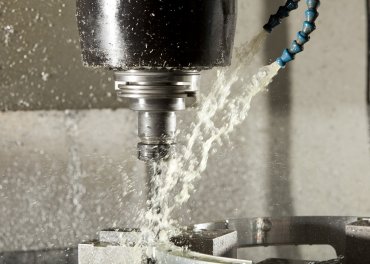SHANGHAI – The Chinese government is trying to bring about major changes in the nations metals manufacturing industry – significantly cutting the number of aluminum producers, for example, while encouraging production of more sophisticated metals.
These trends pose threats and opportunities for suppliers of metalworking fluids, according to speakers at an industry conference here last week. The main message was that suppliers need to continue searching for new fluid technology.

Photo: Q8 Oils
Higher value-added metals often requires more sophisticated metalworking fluids.
Overcapacity and energy consumption are the two biggest challenges many metal processors have to deal with, and they will surely affect MWFs suppliers, said Li Defeng, a director at a Beijing-based association for Chinese processors of nonferrous metals.
Aluminum processing is an example, said Li, speaking at the 2017 China Metalworking Fluids Technology Development Summit on May 10. Facing aluminum oversupply and significant power consumption from aluminum extraction, China began shutting down aluminum facilities in October 2013. Despite the governments efforts, the country churned out nearly 32 million tons of aluminum in 2016, up 2.2 percent from 31.1 million tons in 2015, according to national statistics.
More aluminum facility shutdowns are coming, according to an internally approved but still unpublished National Development and Reform Committee document, Li said. The next intense period of closures will target unapproved factories in Shandong, Xinjiang and Inner Mongolia.
But more capacity cuts is not necessarily bad news for aluminum manufacturers and their MWF suppliers, Li said. It forces both parties to improve and offer more value-added products.
For example, the Made in China 2025 initiative encourages more lightweight vehicles, which demand high-quality aluminum alloys. The same material is demanded by aircraft manufacturing, an arena China forayed into recently with its first commercial jetliner, the Comac C919. These high-quality alloys demand high-performance MWFs, and this is what the MWF industry should look into, Li said.
University of Science and Technology Beijing professor Sun Jianlin agreed. As China moves up the value chain, there will be growing demand for precision machining and lasting surface finishes, he said. From an environment-conscious standpoint, the trend is toward more soluble fluids. Oils will have to evolve with manufacturing for future growth, he said.
In fact, new requirements are already looming. Clients are asking for fluids with better bio stability for longer use, and fluids with no chlorinated paraffins, said Chen Zengtai, manager of chemical products development at the China branch of American firm Quaker Chemical Corp. Quaker is now is using third-generation DNA sequencing technology to analyze biodiversity in MWFs.
Fluids that are cost-effective and eco-friendly with high performance are what our clients seeking from us, Chen said at the summit during an interview with Lube Report Asia. We see it as an opportunity to provide better services in China and eventually to be more competitive in the Chinese market.
For Quaker, China is more important than ever since it agreed in April to acquire Houghton International another global supplier of metalworking fluids. The deal is still waiting for approval from authorities, but Chen said both companies are eager to seek expansion in China.
Houghton is specialized in formulating cutting oils for nonferrous metals like aluminum, while Quaker is good at serving clients processing ferrous metals, Chen said. Our combined resources will allow us to serve a variety of clients in China.
In China, multinationals are competing not only against resourceful state-owned Chinese companies, but also many competitive private local companies. In general, Chinas private metalworking fluid producers have limited resources for research and development. However, as China continues to push for cooperation between companies and academic institutes, private companies are able to improve their R&D capacity in a rather efficient way, said Dai Yuanjing, vice director at Tsinghua Universitys Tianjin Research Institute for Advanced Equipment.
Tsinghua Universitys rich resources allow us to get involved in some of the most advanced technologies in the world, making us a solid R&D partner, Dai said. One of its ongoing projects is developing a cutting oil for titanium alloys processing for Chengdu Aircraft Industry Group, which manufacturers combat aircraft for the Chinese military and makes parts for Comacs C919.
We have done tremendous studies to find the right anti-friction agent, and we found self-emulsifying esters could be the choice. Eventually the fluid will cater to [processing rates of] 100 meters of titanium per minute, Dai said, noting the current standard rate is below 60 meters per minute.
On May 12, Tsinghua University established a research center with Shell to study alternative fuels and vehicle lubricants formulated for energy efficiency. We are happy to work with companies in China on new technologies to serve Chinas future growth, Dai said.